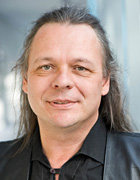
Prof. Dr. Burkhard Rost
Academic Career and Research Areas
Professor Rost (b. 1961) conducts research on bioinformatics and computer-aided biology, with a focus on predicting the functions and structures of proteins and genes. His particular interest is predicting protein interactions and the effects of changing individual amino acids, with the goal of fostering a better understanding of how proteins, genes and cells work. He also focuses on enabling earlier diagnosis and more effective treatment of illnesses. The specific niche of his research group links artificial intelligence and machine learning to evolution.
After studying physics, history and philosophy at the Universities of Giessen and Heidelberg, Professor Rost received his doctorate at the European Molecular Biology Laboratory (EMBL) in 1994. Following research stays at EMBL and the European Bioinformatics Institute in Cambridge (UK), as well as a brief period in industry at LION Bioscience in Heidelberg, he assumed a professorship at Columbia University (New York) in 1998. In 2009, he accepted an appointment to the Chair of Bioinformatics at TUM. He is a member of the New York Academy of Sciences and has been President of the International Society for Computational Biology since 2007. He has authored 200 scientific publications with a Hirsch index of 50 (2010).
Key Publications
Ofran Y, Rost B: “Protein-protein interaction hotspots carved into sequences”. PLoS Computational Biology. 2007; 3: e119.
AbstractSchlessinger A, Liu J, Rost B: “Natively unstructured loops differ from other loops”. PLoS Computational Biology. 2007; 3: e140.
AbstractBromberg Y, Rost B: “SNAP: predict effect of non-synonymous polymorphisms on function”. Nucleic Acids Res. 2007; 35: 3823-3835.
AbstractNair R, Rost B: “Mimicking cellular sorting improves prediction of subcellular localization”. J. Mol. Biol. 2005; 348: 85-100.
AbstractRost B, Sander C: “Prediction of protein secondary structure at better than 70% accuracy”. J. Mol. Biol. 1992; 232: 584-599.
AbstractIf you wish your profile to be changed or updated please contact Franz Langer.